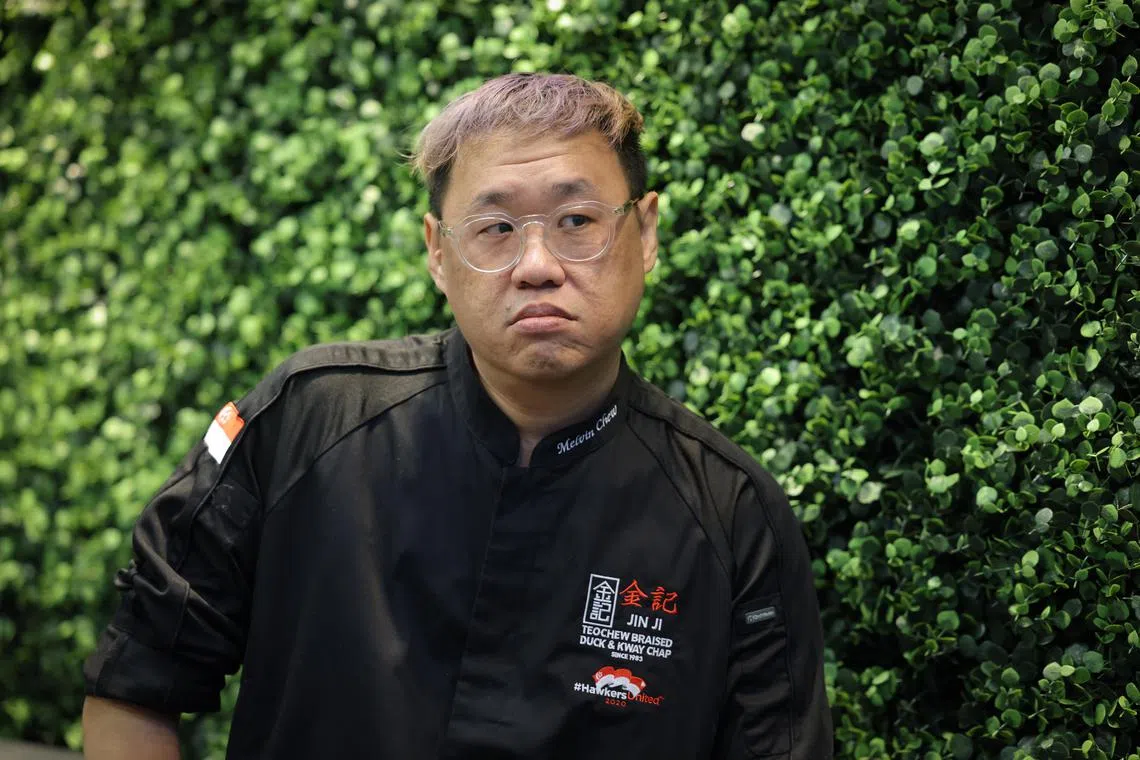The Usual Place Podcast
Eat, shoot and post: What makes a good food reviewer?
Sign up now: Get ST's newsletters delivered to your inbox
Scroll social media and you’ll likely be served a food recommendation or review, often one that’s either enthused or a takedown of sorts.
SINGAPORE – If someone takes videos of their food and serves it with a side of honest opinions, does that make them a good food reviewer?
Don’t get me wrong. I love that we are a nation of foodies, but it seems like it has become trendy to dole out “brutally honest reviews” or provide enthused recommendations without much context on social media.
Intrigued by this proliferation of content creators who feed their audience with clickbaity spiel and pepper their food recommendations with superlatives, I wanted to find out the highlights and pitfalls of online food reviewers in this age of quick-fire social media content.
To help me answer these questions in the latest episode of The Usual Place Podcast, I invited a food and lifestyle content creator, a hawker and a home-based baker-turned-marketing entrepreneur for our living room chat.
Food and lifestyle content creator Chiara Ang, who has almost 20,000 followers on Instagram,
“I think the good thing about social media is that any Tom, Dick or foodie can create content. The food culture is so diverse – it’s good to have voices cover different cuisines.”

Food and lifestyle content creator Chiara Ang has been in the business for about seven years. She hopes more of her peers will put in more effort to understand the dining establishments they intend to feature.
ST PHOTO: ONG WEE JIN
But there is a downside, added Chiara, 31, who used to create content for a local food guide and review site before branching out on her own.
“I feel like the bad thing is that there are a lot of such reviews that lack quality and value.”
Second-generation hawker Melvin Chew, 45, who started the thriving Facebook group Hawkers United - Dabao 2020
Melvin, the owner of Jin Ji Teochew Braised Duck and Kway Chap in Chinatown Complex, said: “There are some who (want) to get some traffic to their content.
“They cannot do the same content (as other creators), so they have to be different. So they start to do negative reviews or talk bad about the business or the hawkers,” he said.
“They have no ‘dao de’,” he added using the Mandarin word for principles or ethics.
My other guest Then Zhi Wei, 27, founder of marketing agency Futurx Creatives, pointed out that professional food critics have always been around, though not all of them have the reach that social media affords.
“The change in the marketing scene and the algorithms (on social media) allow you to know new food reviewers... so yeah, I would say that anyone can actually become a food reviewer nowadays, but they should know what they’re talking about,” said Zhi Wei.
He ran home-based bakery Baba’s Whisk for about five years, and now helps food businesses, as well as those in other industries, to market their products.
He sometimes works with food content creators to promote his clients, and can understand the pressures they face in this new creator economy. Especially, he said, for full-time content creators who have to fight for a slice of the pie to make a living.
He pointed out that content creators may not always get paid for making content about a business, and they may be focused on creating as much content as possible to survive.

Founder of marketing agency Futurx Creatives Then Zhi Wei, who used to be a home-based baker, says that food content creators may be focused on creating as much content as possible to survive.
ST PHOTO: ONG WEE JIN
“You really have to hustle to get your name out there... (You) just got to keep doing more and more and more content.” said Zhi Wei. “I think that also causes them to limit the amount of research done on that specific food, and that results in poorer quality reviews.”
He recently started Food Me Up Singapore
“If we’re getting someone to try ramen, this person better love Japanese food. I’m not going to get someone that loves (only) Western food to go and try ramen.”
Chiara, who has about seven years of experience creating food content, cautions others against posting without consideration.
“I feel like other than ethics, you need to follow some sort of guidelines when you want to do content, because the businesses you’re talking about are about (someone’s) livelihood. You can be a bit more sensitive whilst you’re being brutally honest at the same time.”
In his experience, Melvin said reviews by veteran food critics or long-time food bloggers actually help improve business for hawkers, but he doesn’t like being used to get clicks.

Second-generation hawker Melvin Chew, who sells braised duck and kway chap at Chinatown Complex, hopes that content creators will help food businesses do better, instead of putting out negative reviews.
ST PHOTO: ONG WEE JIN
“The best reviewer is always your customer. They can review (your food) best because they might be... eating your food for many years (or) almost every day.”
He added that he is more likely to trust feedback from these regular customers if they tell him something is wrong with the dish.
Rounding off the conversation, Melvin handed out some words of advice to those interested in creating food reviews or recommendations.
“I believe that every business has a story behind it and a family to feed. If you don’t like it, then don’t just post for the sake of getting traffic, then you demoralise them and condemn them, (until) they are forced to stop their business.”
Who is your favourite food content creator on social media, and what do you like about their style?
Catch this episode out on ST Podcasts’ YouTube channel
I’ll see you next week at The Usual Place,
Nat
------
DM Natasha your thoughts on this topic at her IG: https://str.sg/8Wav
Host: Natasha Zachariah ( natashaz@sph.com.sg
Edited by producers: Teo Tong Kai, Eden Soh and Zachary Lim
Executive producers: Ernest Luis and Lynda Hong
Filmed by: ST Video
Follow The Usual Place Podcast here and get notified for new episode drops:
Channel: https://str.sg/5nfm
Apple Podcasts: https://str.sg/9ijX
Spotify: https://str.sg/cd2P
ST Podcasts YouTube: https://str.sg/4Vwsa
Feedback to: podcast@sph.com.sg
Read Natasha Zachariah’s articles: https://str.sg/iSXm
Follow Natasha on LinkedIn: https://str.sg/v6DN
---
Discover more ST podcast channels:
All-in-one ST Podcasts channel: https://str.sg/wvz7
The Usual Place: https://str.sg/wEr7u
In Your Opinion: https://str.sg/w7Qt
COE Watch: https://str.sg/iTtE
Asian Insider: https://str.sg/JWa7
Health Check: https://str.sg/JWaN
Green Pulse: https://str.sg/JWaf
Your Money & Career: https://str.sg/wB2m
Hard Tackle: https://str.sg/JWRE
#PopVultures: https://str.sg/JWad
Music Lab: https://str.sg/w9TX
---
ST Podcast website: http://str.sg/stpodcasts
ST Podcasts YouTube: https://str.sg/4Vwsa
---
Special edition series:
True Crimes Of Asia (6 eps): https://str.sg/i44T
The Unsolved Mysteries of South-east Asia (5 eps): https://str.sg/wuZ2
Invisible Asia (9 eps): https://str.sg/wuZn
Stop Scams (10 eps): https://str.sg/wuZB
Singapore’s War On Covid (5 eps): https://str.sg/wuJa
---
Get The Straits Times’ app, which has a dedicated podcast player section:
The App Store: https://str.sg/icyB
Google Play: https://str.sg/icyX



